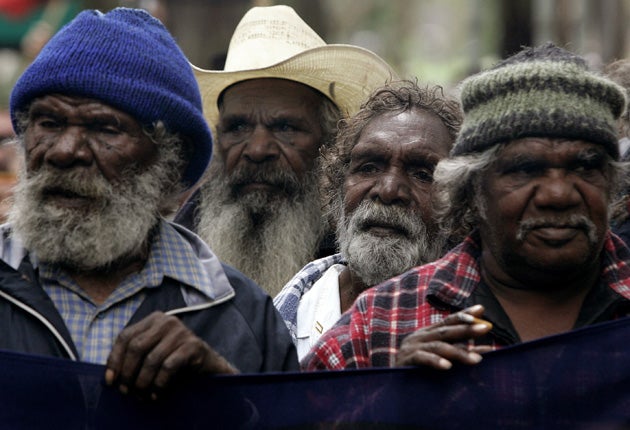After 40,000 years, recognition for Aboriginal people beckons

Your support helps us to tell the story
From reproductive rights to climate change to Big Tech, The Independent is on the ground when the story is developing. Whether it's investigating the financials of Elon Musk's pro-Trump PAC or producing our latest documentary, 'The A Word', which shines a light on the American women fighting for reproductive rights, we know how important it is to parse out the facts from the messaging.
At such a critical moment in US history, we need reporters on the ground. Your donation allows us to keep sending journalists to speak to both sides of the story.
The Independent is trusted by Americans across the entire political spectrum. And unlike many other quality news outlets, we choose not to lock Americans out of our reporting and analysis with paywalls. We believe quality journalism should be available to everyone, paid for by those who can afford it.
Your support makes all the difference.About 40,000 years after Aboriginal people settled in Australia, a referendum is to be held on whether to amend the constitution to recognise them as the country's original inhabitants. The move, announced by Prime Minister Julia Gillard, follows her predecessor Kevin Rudd's apology to the "Stolen Generations" of Aboriginal children forcibly removed from their families. It comes nearly 223 years after the First Fleet arrived in Sydney, heralding the colonisation of Australia by European settlers.
The vote will take place in the next three years – but it is not certain to succeed. With Australians wary of constitutional reform – and a majority required in every state as well as nationally – 36 of the 44 referendums held since 1901 have failed. There is also the obstacle of residual racism.
But some Aboriginal leaders were quick to condemn Ms Gillard's proposal as tokenism yesterday, while others said there were more pressing issues to be addressed, such as the glaring discrepancies in black and white health, living standards and employment.
Sam Watson, deputy director of the Aboriginal and Torres Strait Islander Studies Unit at the University of Queensland, said that if white Australia wanted to make a genuine attempt to incorporate Aboriginal history into the constitution, "you would need to incorporate a recognition of the theft of Aboriginal land, the mass genocide [of] Aboriginal people, the fact that to this day there's not been a legitimate treaty signed between the British Crown and the 500 tribal nations".
The "first people" vote has been a long time coming, but then so was the apology. Children were stolen from their families as far back as 1905.
The battle for Aboriginal rights has been slow. Land rights were recognised only in 1976; Aboriginal people have been recognised as Australian citizens only since 1967, following a referendum passed with a huge majority.
Ms Gillard said she was grasping a rare opportunity to amend the constitution to acknowledge that "the first people of our nation have a unique and special place", because there was broad parliamentary support for the change.
However, her motives are not entirely altruistic. Before agreeing to form a coalition government with her Labor Party after August's election, the Greens made her promise to hold the vote.
The Prime Minister will appoint an "expert panel" to report to the government next year on how the question should be worded. Warning if the vote did not succeed, "there will not be another one like it", she said it was vital to build a prior consensus.
Mick Gooda, the senior Aboriginal official responsible for social justice at the Australian Human Rights Commission, welcomed the referendum, saying that it "will be about us as a nation and about us being mature enough to recognise our history but then to move on from it".
However, Larissa Behrendt, an indigenous academic at Sydney's University of Technology, said: "The danger is that if... it fails, it sends a very bad message to the Aboriginal community and what is supposed to be an act of recognition of the special place of Aboriginal people in Australian society becomes a further insult."
Subscribe to Independent Premium to bookmark this article
Want to bookmark your favourite articles and stories to read or reference later? Start your Independent Premium subscription today.
Join our commenting forum
Join thought-provoking conversations, follow other Independent readers and see their replies
Comments